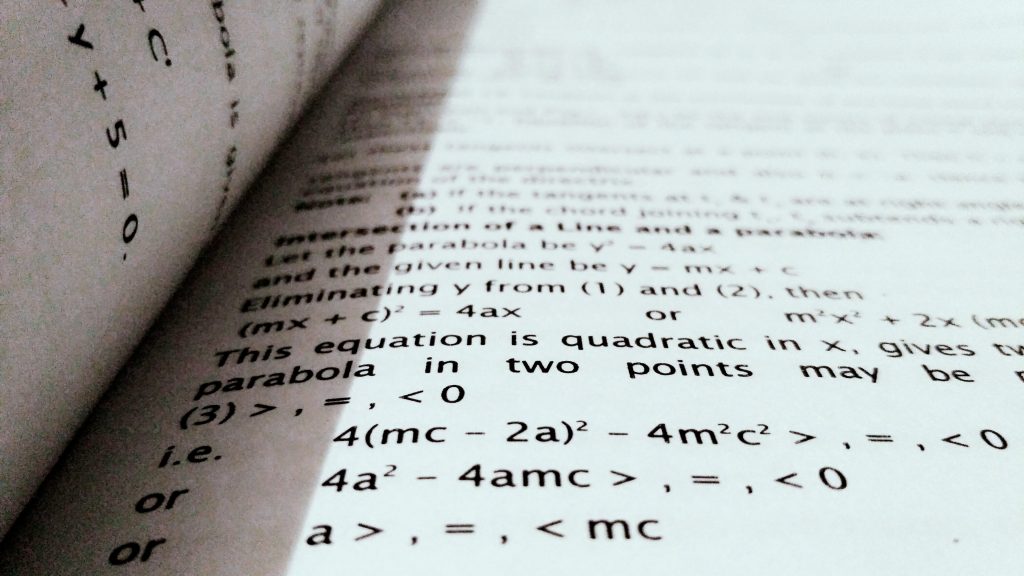Much of the content in HSC 3 Unit Maths builds on and extends what you’ve learned in 2 Unit Maths.
As a result, many students fall into making very common mistakes both in their preparation/study and exam day.
But don’t worry! I’ll take you through the most common mistakes we see in HSC 3 Unit Maths and how to avoid them!
Mistake #1: Not Enough Practice
Mistake #2: Relying Too Much on The Formula Sheet
Mistake #3: Unquestioning Faith in Their Calculator
Mistake #4: Not Knowing Your Unit Circle (for Trigonometry)
Mistake #5: Thinking Everything is Additive
Mistake #6: Integration Errors
Mistake #7: Index Law Errors
Mistake #8: Not Keeping Things Simple
Mistake #9: Focusing on Recipes Rather Than Deep Understanding
Mistake #1: Not Enough Practice

In terms of your preparation, the biggest mistake many students make is simply not doing enough practice.
That is, they focus too much on trying to master the mathematical concepts in isolation without putting them into practice.
You wouldn’t try and master a sport simply by watching it on TV! You might learn a thing or two but at a certain point you need to get outside and physically practice.
How to avoid it: Practice, practice, practice. Do as many past papers as you can. Don’t wait until you’ve finished the course to look at past papers, either! If you’ve finished the probability section, do as many probability past questions as you can. Check out our huge library of past papers here.
Mistake #2: Relying Too Much on The Formula Sheet
All of the mathematics courses are heavy on formulae of different kinds.
However, many students figure that because they have a formula sheet, they don’t need to worry about certain things.
While certain questions can be completed simply by knowing the formula, many of the 3 Unit Maths formulae are slightly more complicated.
HSC questions will test your understanding of the formula, more than your ability to apply it in simple cases.
If all you know is the formula written on the sheet, you may struggle to deal with these questions.
How to avoid it: Pay special attention to the formulae on the reference sheet! They are there because they are important and used often, so make sure you understand the background and different ways they might be tested.
Mistake #3: Unquestioning Faith in Their Calculator

While your calculator doesn’t technically make mistakes, people do.
I have seen many students write answers that were totally incoherent because they wrote down exactly what appeared on their calculator screen.
Even though they had done everything right mathematically, they entered something incorrectly on their calculator and lost marks.
All it takes is for the wrong sign to be entered and if you don’t pay attention you might write down a negative value for a question asking for a distance.
Or perhaps you haven’t swapped your calculator from degrees to radians and you get a positive value for cos(pi).
How to avoid it: Before performing any complex operations on your calculator, make sure you have some reasonable expectation of what you’ll get. Should your answer be positive or negative? Should it be large or small? Are you expecting a surd or a rational number? An integer or a fraction? Taking a second or two to think briefly about what you should get will make you much more likely to notice when you make a mistake and get something incorrect.
Mistake #4: Not Knowing Your Unit Circle (for Trigonometry)
Many students spend lots of time memorising a lot of identities to do with their trigonometric functions.
These can be very fiddly identities, such as cos(pi – x) = -cos(x).
Not only are these very easy to get wrong, students often spend a lot of time memorising them when they could be doing other things.
How to avoid it: Enter the unit circle. Students are often not introduced early enough to the way of defining what sin and cos actually are (hint: more than buttons on your calculator). In fact, if a point travels clockwise around the unit circle by an angle of z, then its x-coordinate will be cos(z) and its y-coordinate will be sin(z).
Watch this video! Once you understand the trigonometric functions in their wider context, a whole heap of identities will become much more natural to remember. More than that, you’ll halve the amount of stuff you need to memorise and minimise the chances of sloppy mistakes.
Mistake #5: Thinking Everything Is Additive
In more advanced maths, we call a function additive if f(x+y) = f(x) + f(y). This is sometimes the case with things we care a lot about.
Derivatives and integrals are additive – so (f + g)’ = f’ + g’. But there are many other important functions that are not additive.
How to avoid it: Keep in mind the following:

Mistake #6: Integration Errors
Integration can be tricky – there are lots of things to keep track of.
Common errors include:
- Forgetting the constant term in an indefinite integral.
- Not changing the bounds of integration when integrating by substitution.
- Using the power rule on exponential functions
How to avoid it: Get in the habit, even when it seems easy, of being as explicit as you possibly can with your working out. No matter how simple the use of the reverse chain rule, write out your substitution and its derivative. Make sure that you know your standard integrals well so you can be more likely to notice any errors you make.
Mistake #7: Index Law Errors
It is incredibly common for students to make errors on simple algebraic manipulations involving indices.
When you are multiplying, you add indices and the base stays the same. 2^4 x 2^2 = 2^6, NOT 4^6.
How to avoid it: Take the time to do a whole bunch of exercises on the index laws from your year 10 or 11 textbook, if it is still around. These are fundamental to so many different parts of the HSC 3 unit maths course that you cannot afford to make mistakes on this front.
Mistake #8: Not Keeping Things Simple

When it comes to 3 Unit Maths, time is of the essence!
According to the notes from the marking centre, each year many HSC students use overly complicated techniques to solve simple questions.
This costs them time that could otherwise be more efficiently used.
Students often take all the time to complete polynomial long division rather than simply using the remainder or factor theorem.
Another common one is to list all the outcomes of a probability question rather than counting systematically.
How to avoid this: Your approach to a question should begin at the most simple option and become more complex if that doesn’t work. This means that at each stage you can be confident that you are scaling up your response to the question in the right way.
Also, it guarantees that whatever way you solve the question will be the quickest or simplest way. The more time you save, the more you can spend on the harder questions.
Mistake #9: Focusing on Recipes Rather Than Deep Understanding
Finally, students often focus on understanding complex procedures in terms of a recipe which they will simply memorise.
However this leaves your understanding rather static and makes it difficult to respond well to slightly unusual or testing questions.
For instance a past 3 unit question asked the students to evaluate ∫sin^2 (2x) dx. Students who had simply memorised the formula ∫sin^2(x) dx = x/2 – sin(2x)/4 were not able to adjust the formula well to the 2x instead of an x.
These students are often poorly equipped to answer some of the 1-mark questions toward the end of these larger questions that ask them to explain, account for or justify some result they have shown.
How to avoid it: Whatever you do, aim at a deep understanding. The point of 3 unit maths is to extend your understanding of mathematical concepts. The HSC exam is unlikely to simply test your ability to memorise results or recipes. Rather, you will be asked to apply complex mathematical concepts as appropriate.
The deeper your understanding, the more you will be able to adapt to the curveballs that the examiners are likely to throw your way.
Looking for some extra help with HSC Extension 1 Maths?
We pride ourselves on our inspirational HSC Extension 1 Maths coaches and mentors!
We offer tutoring and mentoring for Years K-12 in a variety of subjects, with personalised lessons conducted one-on-one in your home or at our state of the art campus in Hornsby!
To find out more and get started with an inspirational tutor and mentor get in touch today!
Give us a ring on 1300 267 888, email us at [email protected] or check us out on Facebook!
Travis McKenna has just finished a degree in Mathematics and Philosophy at the University of Sydney, and will be heading over to America for Grad School in the near future. He enjoys learning languages, playing cricket and writing short stories.


